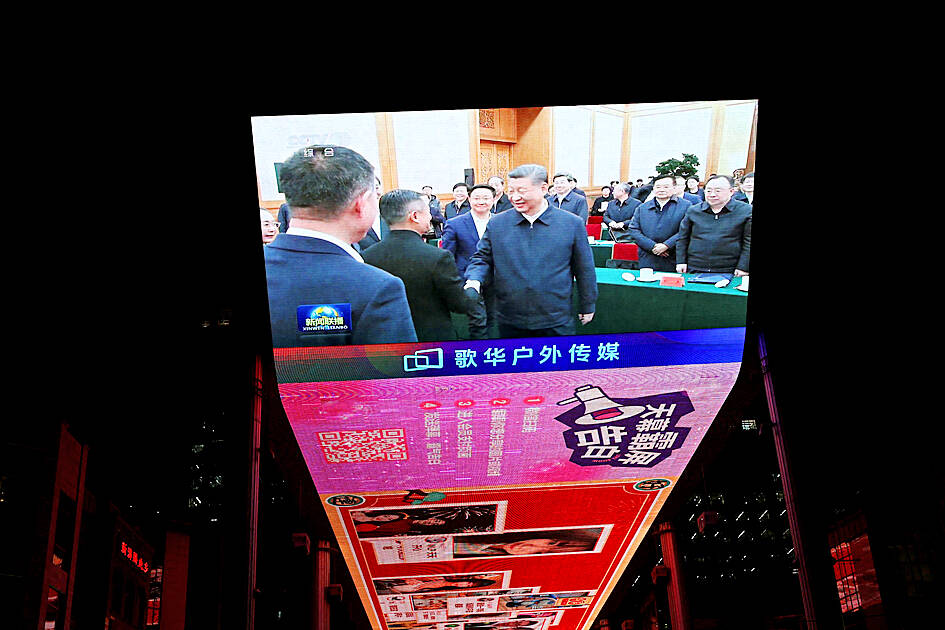Chinese President Xi Jinping (習近平) yesterday presided over a meeting with Alibaba Group Holding Ltd (阿里巴巴) cofounder Jack Ma (馬雲) and other prominent entrepreneurs, signaling Beijing’s endorsement for a long-marginalized private sector now considered key to reviving the world’s No. 2 economy.
The country’s leader drew many of the biggest names in Chinese business over the past decade, representing industries from chipmaking and electric vehicles (EVs) to artificial intelligence (AI). The summit demonstrated Beijing’s softer stance toward the private-sector companies that fuel most of the country’s economy, just as Washington ramps up a potentially debilitating campaign of global tariffs.
Xi delivered a speech after listening to representatives of firms including Ma, Meituan (美團) cofounder Wang Xing (王興) and Xiaomi Corp (小米) chief executive officer Lei Jun (雷軍), Chinese state media reported.

Photo: Florence Lo, Reuters
Also present were Unitree Robotics (宇樹) founder Wang Xingxing (王興興) and Huawei Technologies Co (華為) founder Ren Zhengfei (任正非) — considered key figures in China’s ambition to reduce its reliance on US technology.
Tencent Holdings Ltd (騰訊) founder Pony Ma (馬化騰) — whose WeChat pioneered the “super app” concept that has since been lauded by Elon Musk — attended, a person familiar with the meeting said.
BYD Co (比亞迪) founder Wang Chuanfu (王傳福) and Contemporary Amperex Technology Co Ltd (寧德時代) founder Robin Zeng (曾毓群) also joined the assembly, driving home China’s rapid ascent in EVs.
“This is the strongest signal China could release to boost social confidence. The fact that Xi Jinping himself shows up to meet with the entrepreneurs highlights the political significance of this meeting,” Singapore University of Social Sciences School of Law senior lecturer You Chuanman (游傳滿) said.
Authorities have taken a less combative approach more recently as China’s economy slowed and companies aligned themselves with Xi’s push for leadership in areas such as AI.
Alibaba’s Qwen (通義千問) model has performed well in official benchmark tests and signaled the company’s growing relevance in the field, while Apple Inc is incorporating its AI technology into Chinese iPhones, a vote of confidence in its growing prowess in the field.
“It’s an enabling policy rather than a 180-degree shift,” You said. “China has been pivoting from over-regulation on the property market and private sector before COVID[-19] to releasing positive policy signals to the private economy. We’ve seen a continuing shift in tone from Beijing toward the private sector: tolerance, improvement and encouragement.”
It remains unclear to what extent authorities plan to shift their stance toward the private sector. A show of support by Xi would almost certainly add fuel to the stock-market rally and revive animal spirits among entrepreneurs, but much would depend on whether authorities follow through with more concrete policy actions.

STEEP DECLINE: Yesterday’s drop was the third-steepest in its history, the steepest being Monday’s drop in the wake of the tariff announcement on Wednesday last week Taiwanese stocks continued their heavy sell-off yesterday, as concerns over US tariffs and unwinding of leveraged bets weighed on the market. The benchmark TAIEX plunged 1,068.19 points, or 5.79 percent, to 17,391.76, notching the biggest drop among Asian peers as it hit a 15-month low. The decline came even after the government on late Tuesday authorized the NT$500 billion (US$15.2 billion) National Stabilization Fund (國安基金) to step in to buoy the market amid investors’ worries over tariffs imposed by US President Donald Trump. Yesterday’s decline was the third-steepest in its history, trailing only the declines of 2,065.87 points on Monday and

TAKING STOCK: A Taiwanese cookware firm in Vietnam urged customers to assess inventory or place orders early so shipments can reach the US while tariffs are paused Taiwanese businesses in Vietnam are exploring alternatives after the White House imposed a 46 percent import duty on Vietnamese goods, following US President Donald Trump’s announcement of “reciprocal” tariffs on the US’ trading partners. Lo Shih-liang (羅世良), chairman of Brico Industry Co (裕茂工業), a Taiwanese company that manufactures cast iron cookware and stove components in Vietnam, said that more than 40 percent of his business was tied to the US market, describing the constant US policy shifts as an emotional roller coaster. “I work during the day and stay up all night watching the news. I’ve been following US news until 3am

Six years ago, LVMH’s billionaire CEO Bernard Arnault and US President Donald Trump cut the blue ribbon on a factory in rural Texas that would make designer handbags for Louis Vuitton, one of the world’s best-known luxury brands. However, since the high-profile opening, the factory has faced a host of problems limiting production, 11 former Louis Vuitton employees said. The site has consistently ranked among the worst-performing for Louis Vuitton globally, “significantly” underperforming other facilities, said three former Louis Vuitton workers and a senior industry source, who cited internal rankings shared with staff. The plant’s problems — which have not

TARIFF CONCERNS: The chipmaker cited global uncertainty from US tariffs and a weakening economic outlook, but said its Singapore expansion remains on track Vanguard International Semiconductor Corp (世界先進), a foundry service provider specializing in producing power management and display driver chips, yesterday withdrew its full-year revenue projection of moderate growth for this year, as escalating US tariff tensions raised uncertainty and concern about a potential economic recession. The Hsinchu-based chipmaker in February said revenues this year would grow mildly from last year based on improving supply chain inventory levels and market demand. At the time, it also anticipated gradual quarter revenue growth. However, the US’ sweeping tariff policy has upended the industry’s supply chains and weakened economic prospects for the world economy, it said. “Now